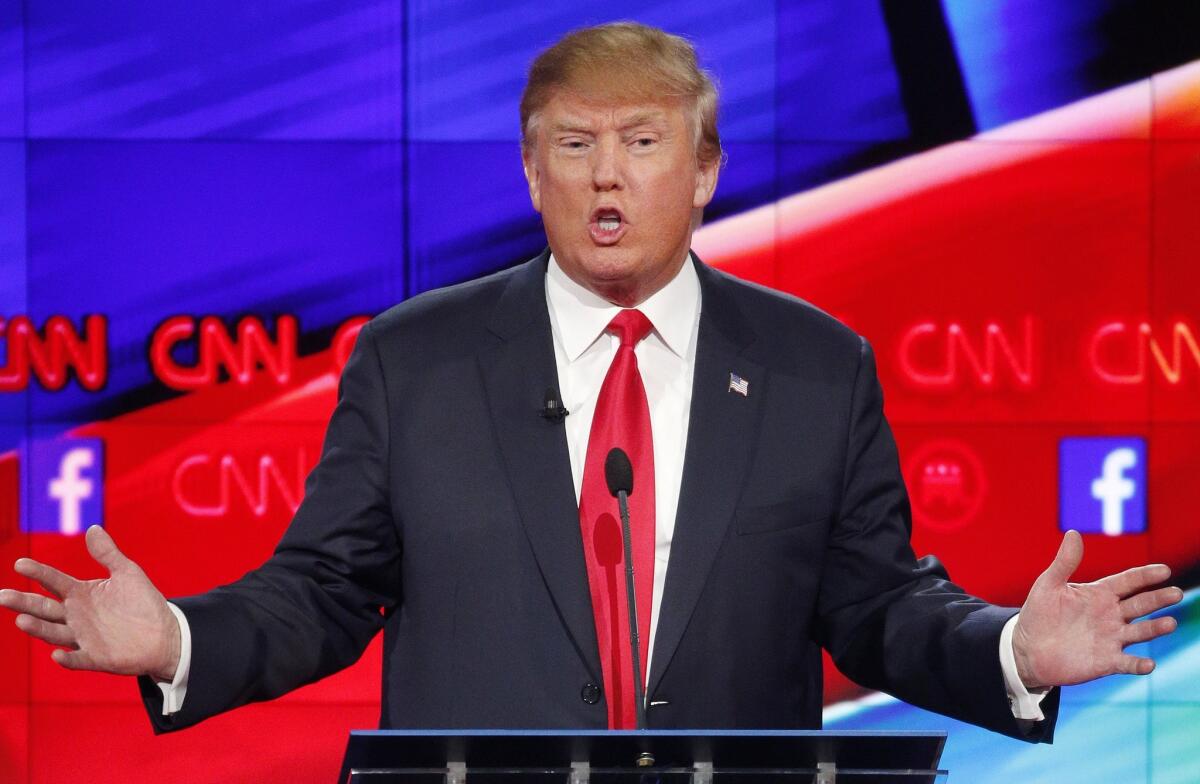Op-Ed: Donald Trump’s rhetoric is helping ISIS -- and vice versa

Donald Trump makes a point during the CNN Republican presidential debate in Las Vegas on Dec. 15.
- Share via
The conventional wisdom holds that Donald Trump is playing into the hands of ISIS. His call for “a total and complete shutdown of Muslims entering the United States” — a temporary measure, he says, “until we can figure out what the hell is going on” — has served only to divide America, offend and inflame Muslims worldwide, and quite possibly drive deeper into alienation the small minority of disaffected Muslims who are teetering on radicalism’s edge.
If we accept the logically straightforward premise that Trump’s pronouncements constitute a form of help to ISIS, an ironic and disquieting corollary follows. ISIS has every reason to return the favor and they are exceedingly well-situated to do so. Indeed, the terror organization is in a position to help Trump further raise his profile, disseminate his message and even pave the way for him to gain the Republican nomination and possibly the White House.
Let us presume that ISIS, however twisted its ideology, has at least a rudimentary understanding of American politics. It wouldn’t take much more than watching CNN for the terror organization’s leadership to gain a rough grasp of our political dynamic. What would leap off of the TV screen is that in the aftermath of the attack in San Bernardino, and following Trump’s release of his proposal to ban the entry of Muslims, the tycoon’s support has surged. He has double the standing of his nearest rival in national polls and is gaining momentum. Perhaps even more significantly, they would see television screens showing mass rallies of wildly enthusiastic Americans cheering Trump as he calls to exclude Muslims from American life. Such images are every bit as valuable to ISIS as images of American soldiers abusing prisoners at Abu Ghraib.
Looking at the American political scene, ISIS would not need a David Axelrod or a Karl Rove in its ranks to understand that well-timed terror attacks in the U.S. could spur a dynamic already in motion and that San Bernardino has accelerated. Although we do not really know how ISIS calculates the time and locations of its operations, history can be a guide. At least some Islamist terrorist attacks appear to have been launched with the goal of influencing the outcome of elections in democratic societies.
[ISIS has} every reason to settle on a strategy that aims at advancing Trump’s prospects on the American political stage.
The most prominent instance is the March 11, 2004 attack on the Madrid transit system three days before the Spanish national elections. Prior to the attack, the government of Prime Minister José María Aznar, which had aligned Spain with the United States in prosecuting the war in Iraq, was leading in the polls by 5%. The Al Qaeda terror operation succeeded in killing 181 people and maiming 1,800 more, had a demonstrable effect on public opinion. The Socialist Party, led by José Luis Rodríguez Zapatero, who had pledged to end Spain’s participation in the war, ended up winning the election by 5%. It would not be difficult for the leadership of ISIS, looking at this Al Qaeda success, to have concluded that the terror attacks succeeded in swinging the electorate by a whopping 10 percentage points.
Could ISIS attempt to replicate such an influence operation in the United States? There is a high probability that the resources for carrying out such a strategy are already in place. The FBI says it has active investigations of ISIS supporters in every state, with some 900 open cases. And, of course, as alarming as those numbers are, they include only the suspects of whom the U.S. intelligence community is aware. As is made plain by the husband-wife team that conducted the San Bernardino massacre, homegrown jihadist cells can acquire lethal weapons and operate in the United States completely beneath the radar screen. The FBI and the rest of the intelligence community do not know what they do not know.
Looking at the United States in the aftermath of San Bernardino, ISIS might well conclude than another such operation — or several — in the period immediately before the Iowa caucuses, would fuel enthusiasm for their candidate of choice. If Trump does succeed in securing the Republican nomination, they might also conclude that attacks during the general election season would severely undercut Hillary Clinton. After all, she is inextricably tied to an administration that — at that juncture — would have spectacularly failed to keep the country secure.
One can think of many reasons why such a scenario might not come to pass, not least of which are the now redoubled efforts of the FBI to keep the country safe. But as ISIS looks at the disarray in American politics, and if it has the resources in place, it would have every reason to settle on a strategy that aims at advancing Trump’s prospects on the American political stage. Even if they fail at the difficult-to-accomplish goal of making Donald J. Trump the 45th president of the United States, they would have succeeded handsomely in helping him spread his vile and venomous anti-Muslim propaganda. Win or lose, his candidacy is for them a bonanza.
Gabriel Schoenfeld, a senior fellow at the Hudson Institute, was a senior advisor to the Mitt Romney campaign in 2011 and 2012.
Follow the Opinion section on Twitter @latimesopinion and Facebook
More to Read
A cure for the common opinion
Get thought-provoking perspectives with our weekly newsletter.
You may occasionally receive promotional content from the Los Angeles Times.









